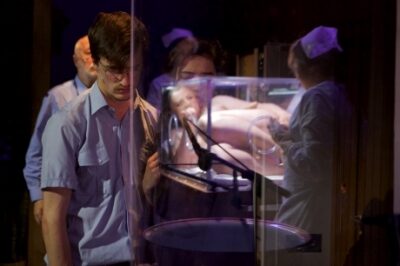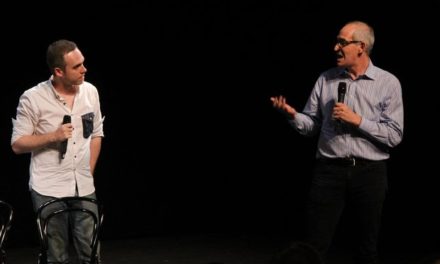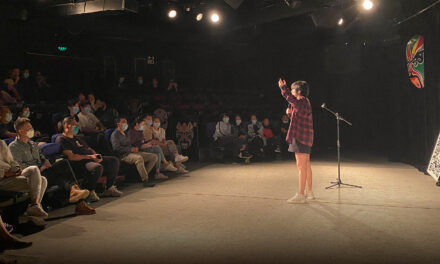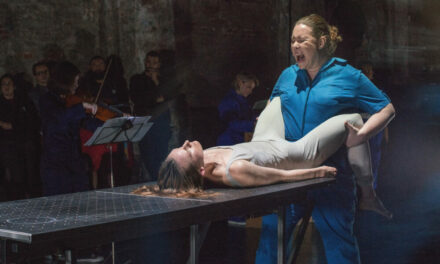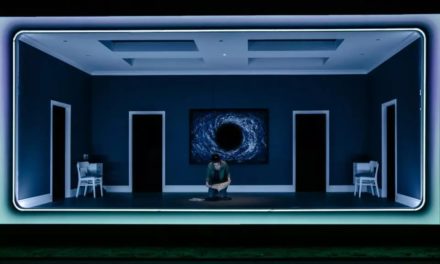An interview with Gabriela Carrizo, a founding member of Peeping Tom
After ten years we had the pleasure of seeing the Belgian Peeping Tom theatre company in Trafó once again. We had a chat with Gabriela Carrizo, the director of Moeder (Mother) about remembrance, time, family and teamwork.
Revizor: You have been to Hungary before, and then you also brought a piece of a trilogy. Moeder is the second part of a family-themed series in production, following Vader (Father) and preceding Kind (Child), which is to premiere in 2019. Is it fair to say that you think in terms of trilogies?
Gabriela Carrizo: That has been our attitude since the beginning with Franck Chartier, the other leader of the company, with whom I almost always work together. He directed Vader, I directed Moeder, and we’ll direct the third part together. Personal backgrounds contributed to the work. Franck wanted to process his relationship with his father, I was inspired by motherhood. It is a trilogy, as the given topics interconnect, but the parts of the series are complete plays in their own right. Vader is set in a home for the elderly, it muses on the aspects of mortality, and my direction sets off with the end, with the mother dying, which is followed by giving birth, being born.
R: The show was also inspired by your mother’s death.
GC: True, it is based on my own experience. We rehearsed for four and a half months, during which time the personal stories of the performers were weaved into the performance in an organic manner, we worked from a common set of memories. I always start my work with the scenery, so the starting point was the space seen in Moeder, to which there were numerous associations from the very first moment. For me the presence of sounds on stage is equally important, this is also something we focused on from the outset. The sound effects made by the dancers and the actors on stage are essential parts of the show. Through them, I wanted to portray the layers of wandering in our memories in as many dimensions as possible. The sound is the first thing we get from our mother even before we see her. It is important to note that the play is not about my own relationship with my mother, so many things were added to it later. Perhaps certain aspects of fragmentation, of absence is common in us all.
R: In addition to painful and sometimes tormenting scenes the play is infused with humor in the most unexpected instances. And it is extraordinary due to its narration with images, the choreographic components, the intense moments of the actors, musicality and dreamlike effects, and all these interweave and characterize the show in equal proportions. There are hardly any parts with actual lines. Is that a conscious ambition, can the same be said of all your work?
GC: Absolutely. We like to work with simple texts and as little text as possible. The first rehearsals are not like that, sometimes we need to tell the dancers to chat less, and to concentrate on their bodies! (Laughs). When the play begins to take shape, we chuck most of the lines. The text that remains is very simple indeed, and mostly the source of comedy – as you’ll see in Moeder.
R: During your tours, you also work with locals. How and why?
GC: The power of personal encounters is important, this way we get some fresh blood into the system. We have a different kind of contact with the city we perform in this way, we get to know new people and even the show changes. Mostly we hire people who have never stood on stage before, so it is a great experience for them too.
R: On the home page of Trafó we see that Franck Chartier, your constant co-creator is the play reader of the show and its director’s assistant. Is that accurate, was this the nature of your cooperation?
CG: No, it is not, but we were unable to come up with a better definition. (Laughs). The father and mother parts of the current trilogy are the first works of ours for which we are not both credited as directors. But of course, we did work closely together. Play reader… well, I guess so. I would rather say that it was highly enjoyable and at the beginning difficult to find the adequate proportion of the two of us. The fact that this time one of us plays a more important role, and the other assists from somewhat farther away.
R: Why did you decide to the direct the parts of this trilogy separately?
GC: In the past years we were asked individually to work on external projects. It was great to see what it was like to work with other people. The difficulty was of course that theatres rehearse for about 5-6 weeks, we are used to at least triple that. But it was a good, fruitful period. Moreover, there were reasons related to the family, as we spend all our time together, we agreed that it would be good to travel other roads as well if you follow me (laughs)… We learned a lot from our solo work, which in turn influences our joint ventures.
R: How did you cope with only weeks of rehearsal on external projects? Is that not stressful for someone used to several months of preparation?
GC: Of course it is, very much so. But fortunately, I was commissioned to do shorter pieces, not entire shows. I had to learn to provide more specific instructions sooner in a more direct manner than what I was used to. There is no time for organic character development. A lot of stress is involved. But Peeping Tom was not exactly stress-free either, as we started it from scratch.
R: What methods do you employ to handle stress?
GC: I do not have methods, that is the problem. After directing Moeder, I had a pretty bad period with burnout syndrome, I was exhausted. We both always work an awful lot, at times like this we need to find our way back home, it is important to live a family life, too. Sometimes stress motivates me, like in Munich, where I had little time for my performance. To my external projects, I always take someone from Peeping Tom with me, gives me a sense of security. And I am always inspired by working with new people, maybe this approach is part of stress management. After all, our work is about human encounters, that is the most important. Another typically difficult situation is when I feel lost during the rehearsal process. But that is creation itself. We discover we explore, and that is often terribly scary.
R: Yes, I think it is important to talk about that, as it is a natural part of the work. On the other hand, society usually trains us not to reveal our vulnerability, because that makes one weak. I think it would be a lot healthier to admit to these as if you have a deep conversation with someone, it usually turns out that they experience helplessness as well at certain points in time, but will not share it.
GC: I completely agree. Bring it out in the open!
R: Do you have plans to celebrate your twenty year anniversary?
CG: We will perform the entire trilogy in Brussels, that’s for sure. We’ll organize workshops and we would really like to publish some of the audio-video material of our rehearsals. We document everything, so we have a lot of raw material. So many good scenes never make it to the shows! I would like for people to see them.
Trailer of Moeder by Peeping Tom theatre company
This interview was originally published in Revizor on February 6, 2018, and is reposted with permission.
This post was written by the author in their personal capacity.The opinions expressed in this article are the author’s own and do not reflect the view of The Theatre Times, their staff or collaborators.
This post was written by Panni Néder.
The views expressed here belong to the author and do not necessarily reflect our views and opinions.

